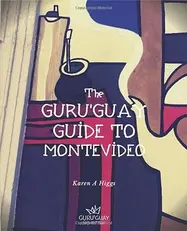
Guru’Guay Guide to Montevideo - by Karen Higgs
ISBN: 1693100533Date read: 2024-05-25
How strongly I recommend it: 3/10
(See my list of 430+ books, for more.)
Go to the Amazon page for details and reviews.
Basic information in preparation for travel.
my notes
There was a dictatorship in Uruguay from 1973 to 1985.
Inflation spiralled and the Uruguayan quality of life, which had been very high, fell.
A long and pragmatic tradition of market intervention and nationalisation. The state controls all public utilities and fixes prices for essentials like milk.
You can drink the water virtually anywhere. Public services in general here are very good - and they are all in state-controlled hands.
Why is Uruguay so progressive?
The legacy of a free-thinking president called Jose Batlle y Ordoñez from 1904 until the early 1930s.
He backed universal suffrage regardless of sex and race, a complete separation of church and state.
All religious holidays were secularised, explaining why Holy Week is known as Tourism Week here.
No fault divorce was legalised in 1907 (compare with neighbours Argentina and Chile which did not legalise it until 1987 and 2004 respectively)
Uruguayans are very polite.
The British of Latin America.
A certain reserve that is unexpected in a Latin.
Uruguayans are the only ones that walk around serving their mates as they go.
They pronounce the double “ll” and “y” like zzhh, so “uruguayo” (Uruguayan) is pronounced oo-roo-GW-EYE-zzhoh, not oo-roo-GW-EYE-yo like it would be in most of Latin America.
To the rest of Latin America, this sounds kind of sexy.
German-American tour guide Christine Dulin, who has been based in the city for more than half a decade, offers a tour of the capital.
A friend from Calgary in Canada had never felt as cold as she did during that winter in Montevideo.
The Old City is busiest on weekdays.